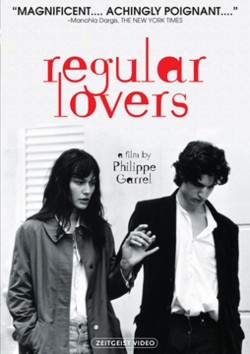|
Reviews of Recent Independent, Foreign, & Documentary Films in Theaters and DVD/Home Video
Directed by: Philippe Garrel. Produced by: Gilles Sandoz. Written by: Philippe Garrel, Arlette Langmann & Marc Cholodenko. Director of Photography: William Lubtchansky. Edited by: Françoise Collin, Philippe Garrel & Alexandra Strauss. Music by: Jean-Claude Vannier. Released by: Zeitgeist Video. Language: French with English subtitles. Country of Origin: France. 175 min. Not Rated. With: Louis Garrel, Clotilde Hesme, Julien Lucas & Mathieu Genet. DVD Features: New transfer in original full-screen theatrical aspect ratio. Venice Film Festival press conference featuring director Philippe Garrel, stars Louis Garrel and Clotilde Hesme & producer Gilles Sandoz. Philippe Garrel filmography. French trailer. New essay on Philippe Garrel by film critic Kent Jones. At about the midpoint of director Philippe Garrel’s realistically tragic take on the French uprisings of May 1968, a poet, François (Garrel’s son, Louis), recites for his girlfriend, Lillie (the radiant Clotilde Hesme), the following line from one of his works: “To close the eyes in the terrible roar of nothingness.” While the moment is treated as a throwaway, it’s possible to make the case that this film – a black-and-white, quite understated and contemplative slice of life in the midst and then wake of the infamous events against which it is set – tempts the viewer into feeling the same way. With its limited camera movement, essentially muted nature, and unpolished overexposures, the movie has been favorably cited in contrast to Bernardo Bertolucci’s 2003 The Dreamers, which covers the same historical period (and also features Louis Garrel), and to which Regular Lovers, however misguidedly dreary, actually serves as both a direct and indirect response. The solemnity of Lovers does appear deliberate: its college-age characters, whose facial expressions are ones of stoned boredom, speak in enigmatically laconic bursts; the camera lingers on their faces for an extremely long amount of time; and everyone seems to be suffering from a withdrawal-like hangover in the face of reality and disillusionment. This is all of a piece with Garrel’s rigidly formal methodology, showcased through static, long takes recording the riots in virtually a documentary style – a counterpoint to the rainbow candy colors, overtly graphic sexuality, and the showy editing trickery of Bertolucci’s glossily superficial and melodramatically (if much more vibrantly) tragedy. As such an approach would inevitably imply, Lovers lends a much more depressing, less hedonistically giddy, vibe to the proceedings. This is, obviously, the point: the plot (or what there is of it) revolves around the central couple’s almost reluctant realization of their love for each other, along with their friends’ adjustment (or lack of it) to compromising their ideals and their reconciliation of the trappings of privilege with social purpose. Despite succeeding at dealing with the latter two of these elements in a substantive way and here surpassing the somewhat more optimistic Dreamers, the nearly three-hour Regular Lovers feels as aimless and tangent chasing as its characters, strikingly digressive and more than a bit self-indulgent. DVD Extras: In the Venice Film Festival press conference, director Garrel speaks in a ramble that feels as if what he’s saying has been lost in translation, even as it’s being translated into English. In any case, he discusses filmmaking’s “bearing witness,” and describes his approach to history as in keeping with Stendhal’s emphasis on “how history wounds you.” This notion could be further understood as indicative of Garrel being rooted in a theoretical groundwork similar to that of the French New Wave, whom Bertolucci’s film pays tribute to (and whom Garrel’s movie itself references more subtly through the occasional use of iris shots, a quality the New Wave cinephiles would’ve appreciated).
The essay by film critic Kent Jones, while laudatory, hits the nail right on the head with the following passage: “In [Garrel’s] signature moments of
time-stopping portraiture, the camera remains so still and patient that the gestures of his characters seem to extend into infinity.” The question one
might ask, then, is whether such a sense of neverending, excruciatingly slow-paced time is as fine a characteristic as Jones thinks it
is – especially (if not least of all) for the viewer.
Reymond Levy
|

